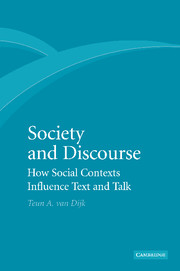5 - Context and politics: the Iraq debate in the British parliament
Published online by Cambridge University Press: 31 August 2009
Summary
Introduction
In this final chapter I shall illustrate the theoretical framework developed in this book and Discourse and Context, and provide some more details about the first analyses of a parliamentary debate about the Iraq war, namely the speech by Tony Blair on March 18, 2003. Then I shall also examine contextual dimensions of the rest of this long debate. In the analyses, I shall especially focus on some of the political aspects of the contexts of this parliamentary debate, such as identity, knowledge and political implicatures (for further analysis, both of the British parliament, and of related Iraq debates in the Spanish Cortes, see also Van Dijk, 2003b, 2003c, 2003d, 2003e, 2006a).
Context and political identity
We have seen throughout this book that various kinds of participant identities are crucial for contexts and hence for discourse. The same is true in parliamentary debates, and we have already found that Tony Blair's position as Prime Minister and leader of the government and the Labour Party, as well as his identity as being British, play a vital role in his speech. The same is true for the MPs who form his audience. Let me therefore examine these identities in somewhat more detail.
- Type
- Chapter
- Information
- Society and DiscourseHow Social Contexts Influence Text and Talk, pp. 213 - 247Publisher: Cambridge University PressPrint publication year: 2009

